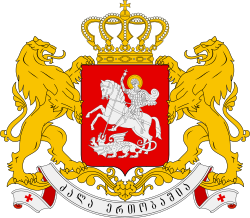| The Economic Liberty Act | |
|---|---|
 | |
| Parliament of Georgia | |
| |
| Territorial extent | |
| Enacted by | Parliament of Georgia |
| Signed by | President Mikheil Saakashvili |
| Signed | 5 July 2011 |
| Commenced | 31 December 2013 |
| Introduced by | President Mikheil Saakashvili |
| Introduced | 29 December 2009 |
| Voting summary |
|
| Status: In force (amended) | |
The Economic Liberty Act of Georgia was adopted by the Parliament of Georgia in 2011. [1] [2] The act was introduced by President Mikheil Saakashvili in September 2009, as a way of enacting principles based on the Rose Revolution. The act has been in force since January 1, 2014. [3]